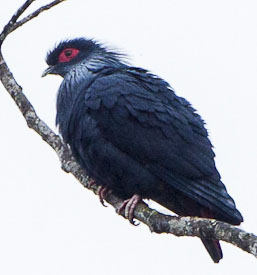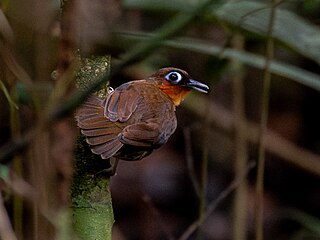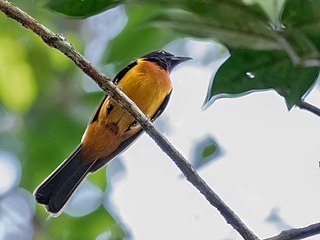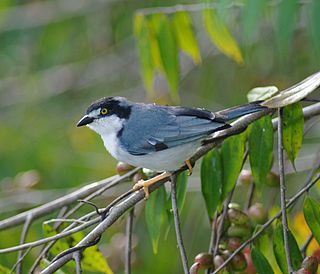
The black-headed lapwing or black-headed plover is a large lapwing, a group of largish waders in the family Charadriidae. It is a resident breeder across sub-Saharan Africa from Senegal to Ethiopia, although it has seasonal movements. It lays two or three eggs on a ground scrape.

The vinaceous dove is a bird species in the pigeon family Columbidae that widely resident across the Sahel and Sudan (region).

The Caribbean martin or white-bellied martin is a large swallow.

The white-lined tanager is a medium-sized passerine bird in the tanager family Thraupidae. It is a resident breeder from Costa Rica south to northern Argentina and on the islands of Trinidad and Tobago.

The scaled pigeon is a large New World tropical dove. It is a resident breeder from southern Mexico south to western Ecuador, southern Brazil, northern Argentina, and Trinidad.

The Sri Lanka green pigeon or Ceylon green pigeon is a pigeon in the genus Treron. In Sri Lanka, this bird and several other green pigeon are known as bata goya in the Sinhala language. It is found in the forests of Sri Lanka. Many authorities split the species from the pompadour green pigeon complex.

The crowned lapwing, or crowned plover, is a bird of the lapwing subfamily that occurs contiguously from the Red Sea coast of Somalia to southern and southwestern Africa. It is an adaptable and numerous species, with bold and noisy habits. It is related to the more localized black-winged and Senegal lapwings, with which it shares some plumage characteristics.

The gray-headed lovebird or Madagascar lovebird is a small species of parrot of the lovebird genus. It is a mainly green parrot. The species is sexually dimorphic and only the adult male has grey on its upper body. They are native on the island of Madagascar and are the only lovebird species which are not native on the African continent. They are the smallest of the lovebird species. It is rarely seen in aviculture and it is difficult to breed in captivity.

The Greater Antillean grackle is a grackle found throughout the Greater Antilles, as well as smaller nearby islands. Like all Quiscalus grackles, it is a rather large, gregarious bird. It lives largely in heavily settled areas.

The Madagascar ibis, also known as the Madagascar crested ibis, white-winged ibis or crested wood ibis, is a medium-sized, brown-plumaged ibis. It has bare red orbital skin, yellow bill, red legs, white wings and its head is partially bare with a dense crest of green or gloss blue and white plumes on the nape. The Madagascar ibis is the only member of the genus Lophotibis.

The giant snipe is a stocky wader. It breeds in South America. The nominate subspecies G. u. undulata occurs in two distinct areas, one in Colombia, and the other from Venezuela through Guyana, Suriname and French Guiana to extreme north-eastern Brazil. The southern subspecies G. u. gigantea is found in eastern Bolivia, eastern Paraguay and south-east Brazil, and probably also in Uruguay and north-eastern Argentina.

The black nunbird is a species of near-passerine bird in the family Bucconidae, the puffbirds, nunlets, and nunbirds. It is found in Brazil, French Guiana, Guyana, Suriname, and Venezuela.

The Madagascar blue pigeon or Madagascan blue pigeon is a species of bird in the family Columbidae. The species is closely related to the other two extant species of blue pigeon, the Comoros blue pigeon and the Seychelles blue pigeon. It is endemic to northern and eastern Madagascar.

The Madagascar buttonquail is a species of bird in the buttonquail family, Turnicidae, that is endemic to Madagascar and a few small islands nearby. It is a ground-dwelling species with an unusual breeding biology in which the sexual dimorphism is reversed, with female being more brightly coloured than the male and it is the male that incubates the eggs and mainly cares for the young.

The crested drongo is a passerine bird in the family Dicruridae. It is black with a bluish-green sheen, a distinctive crest on the forehead and a forked tail. There are two subspecies; D. f. forficatus is endemic to Madagascar and D. f. potior, which is larger, is found on the Comoro Islands. Its habitat is lowland forests, both dry and humid, and open savannah country. It is a common bird and the IUCN has listed it as "least concern".

The variegated antpitta is a species of bird in the family Grallariidae. It is found in southeastern Brazil, eastern Paraguay, the Guianas and the northern Amazon Basin. Its range extends to Venezuela in the northwest; in the Amazon Basin, it is found in the downstream half of the basin, as well as in the Atlantic outlet region of the neighboring Tocantins-Araguaia River drainage to the southeast. A minor disjunct population is in Peru, and an Argentinian population is found in the tongue of land between Paraguay and southern Brazil.

The rufous-throated antbird is a species of bird in the family Thamnophilidae. It is found in Brazil, French Guiana, Guyana, Suriname, and Venezuela. Its natural habitat is subtropical or tropical moist lowland forests.

The fulvous shrike-tanager is a South American bird in the tanager family Thraupidae. It is found in Brazil, Colombia, Ecuador, French Guiana, Guyana, Peru, Suriname, and Venezuela. Its natural habitat is subtropical or tropical moist lowland forests.

The hooded tanager is a species of bird in the tanager family Thraupidae. It is found in Argentina, Bolivia, Brazil, Colombia, French Guiana, Guyana, Paraguay, Peru, and Venezuela. Its natural habitats are subtropical or tropical moist lowland forest, subtropical or tropical mangrove forest, and heavily degraded former forest.

The Buru green pigeon is a pigeon in the genus Treron. It is found in the forests of Buru in Indonesia. Many authorities split the species from the pompadour green pigeon complex.






















